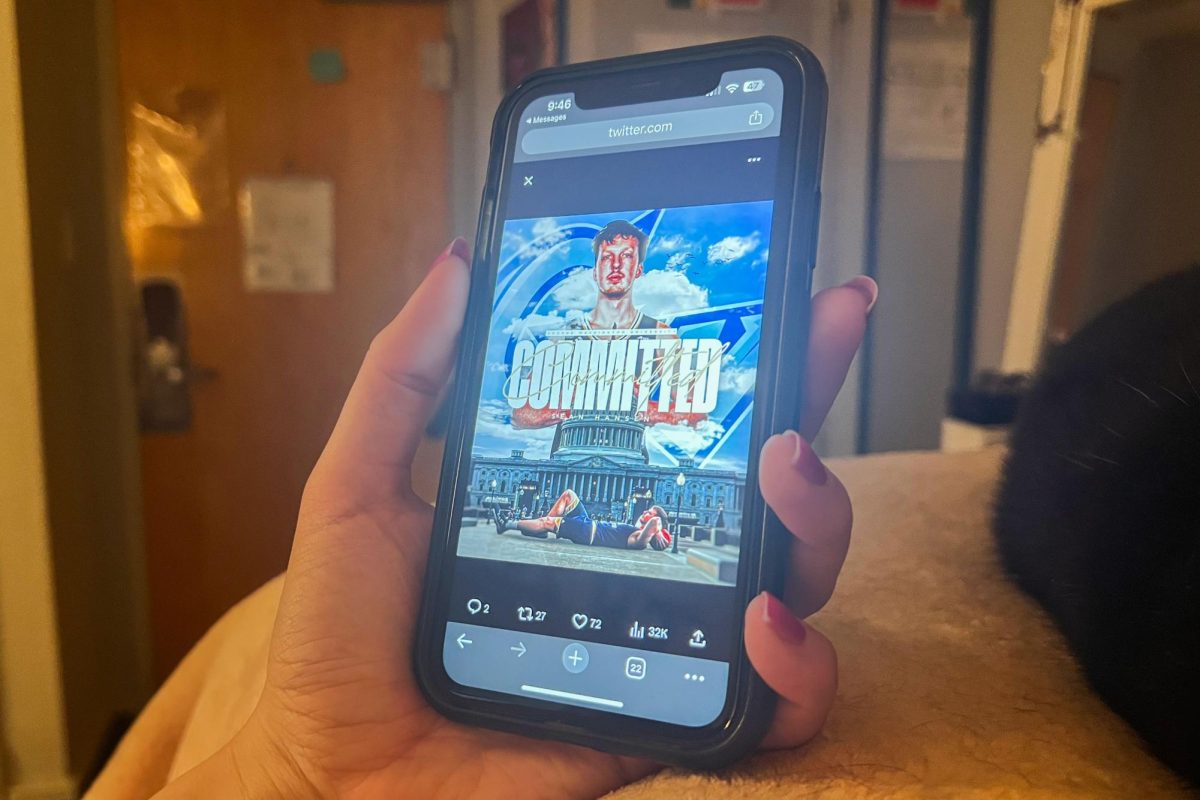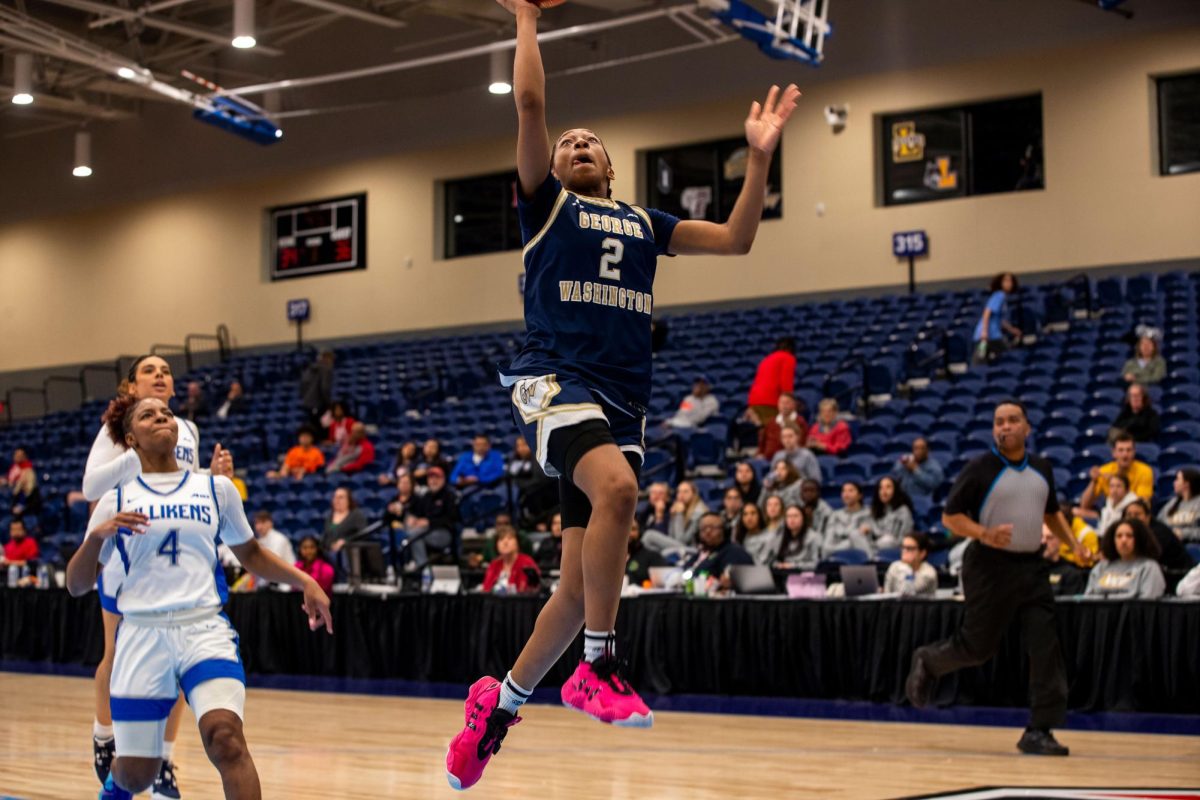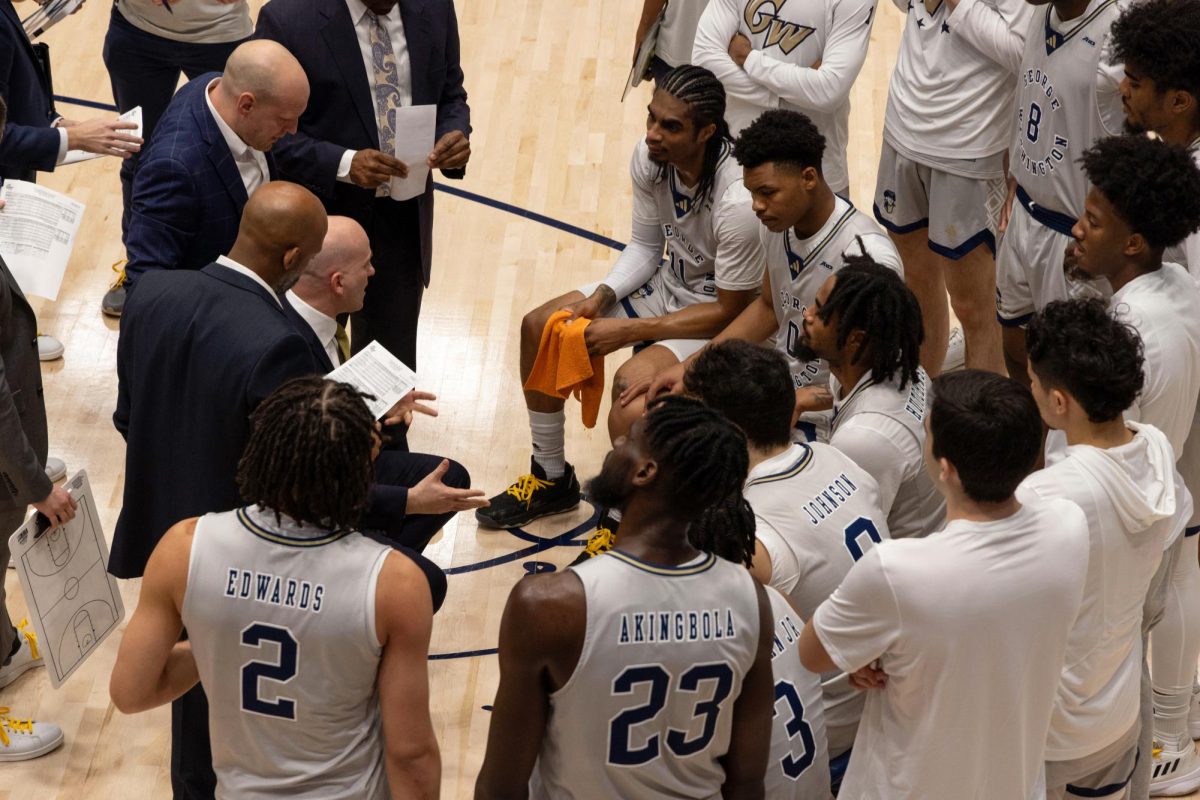Few outsiders could point to serious problems with the GW men’s basketball program.
All one has to do is look at the facts. The Colonials finished with a record of 24-9, one of the best seasons in school history. The team received its highest-ever seed (ninth) in this year’s NCAA Tournament. And despite a first-round loss to Oklahoma State University in the tourney, the team was competing in its fifth straight postseason event.
Players graduating from this year’s team, though, say the program’s outward success covers internal trouble – specifically the often-strained relationship between some players and head coach Mike Jarvis.
“I gave four years of sweat and hard work in the classroom and on the court, and for me to say I can’t recommend that you go to George Washington University to play basketball, that’s a disgrace,” senior Darin Green said. “And the reason I can’t is because of one person (Jarvis), just for fear that someone might go through what I went through.”
Green and fellow senior Rasheed Hazzard, who both saw their playing time fluctuate during four seasons at GW, say they became disenchanted with the program – and Jarvis – for reasons other than dwindling court time.
“I never felt like he had a personal concern for me,” Hazzard said. “When I came here, I was really looking for a relationship that would last awhile – and for Coach Jarvis to help me develop as a young man. I just never got that from him.”
Jarvis says such disappointments are a normal outcome of coaching a group of young men.
“Coaching is like parenting,” Jarvis said. “Sometimes the kids are happy, sometimes they’re not.”
Lack of rapport?Players of past and present have different opinions concerning Jarvis and his relationship with his players.
“The way I dealt with playing there, it was business, it was my job,” said Marcus Hart, a 1994 GW graduate. “There were a lot of players who were unhappy with the situation, and I could see where they were coming from. But more than anything, I didn’t take a lot of stuff personally.”
“I don’t really see him as a friend,” said a player returning to next year’s team who asked to remain anonymous. “But we have a fairly good professional relationship.”
Antoine Hart, who graduated in 1995, had a different take on the players’ relationship with Jarvis.
“The player-coach relationship wasn’t what I expected,” Hart said. “Initially, I was looking for a father figure, but that never developed. It always seemed like there was something missing between us as a player and a coach.” Hart did say that his relationship with Jarvis has improved since he graduated.
“I admire him as a person and as a coach,” he said. “Overall, I think he’s good for the program and for the school.”
Green and Hazzard say they see serious problems with the way Jarvis interacts with his players. Both players cited favoritism, negative reinforcement and a lack of communication on Jarvis’ part.
“He pits players against each other, and that’s going to cause animosity, and you can’t go forward from there,” Green said.
Jarvis says the program has proven to be one players stick with, despite any problems Green, Hazzard or others see in his coaching style.
“Very few players have left our program, and those that have left because they wanted more playing time other places,” Jarvis said.
“If guys stay and graduate, then we’re doing a great job. I wish everybody could be happy, but everybody’s not going to be happy. It doesn’t work that way in sports. That’s why kids transfer from schools all the time.”
Family tragediesTwo events during Hazzard and Green’s college careers are vivid in their minds when they think of Jarvis.
Hazzard’s father Walt, a college standout with UCLA and later the program’s head coach, suffered a severe stroke shortly after GW’s loss to the University of Iowa in the first round of the 1996 NCAA Tournament.
Hazzard stayed with his family for the next two weeks in Los Angeles, Calif. before returning to campus. It was another two weeks before he had any contact with Jarvis.
“Coach Jarvis never, as far as I know, never made any attempt to contact me or call me personally,” said Hazzard, adding that he had contact with assistant coaches, and even received flowers from former assistant Scott Beeten.
“And as a player, you expect that from a person you want to care about you. I almost cry about it when I think about it because I want to be a coach some day, and I would never do that to a kid.”
Hazzard, during the remainder of his second semester after his father’s stoke, earned his best grade point average at GW.
“I think Coach Jarvis should have at least taken a moment and given him (Rasheed) a pat on the back for toughing it out and doing well,” said Jaleesa Hazzard, Rasheed’s mother. “There are other pressures on coaches, but they should be able to strike a balance between the basketball and personal parts.”
Green’s story, while different, parallels Hazzard’s. During the 1997-’98 season, Green’s great-uncle passed away. He returned home to be with his family, which caused him to miss GW’s home game against Temple Feb. 22.
“My family expected me to be there, and that was more important to me than GW and basketball,” Green said. Despite Green’s messages to Karen Ercole, assistant coordinator of academic support for the team, and Hazzard, he and Jarvis had a confrontation at practice about Green’s absence.
“The first thing he said to me was, `Where were you?’ ” Green said. “Not `Hey how are you, how is the family, how were the services, is there anything I can I do for you?’ I knew that he knew what had happened.” As a result, Green was left at GW when the team traveled to Virginia Tech Feb. 25.
The futureAlthough the program is a winning one, Hazzard says he feels an element is lacking at GW.
“Regardless of what anybody has to say about him (Jarvis), he has gotten the program to the point where it is successful,” Hazzard said. “Coach-player relations, that’s what’s going to take the program to the next level. That’s the stuff where you’ve got that bond between player and coach, that’s something you can’t buy. And I don’t think they have it here.”
Both players, though, insist their time at GW has been an overall positive experience, even if the basketball part of it did not turn out as they expected.
“I’ve taken all the positives and negatives, and it’s made me a better person,” Green said. “Do I regret not transferring? Yes. But did I make a positive out of my situation? Yes.”-Dave Mann contributed to this report.







